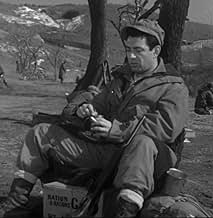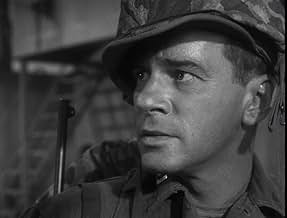The saga of a battalion of U.S. Marines during the Korean War, starting with their training, landing at Inchon in 1950, advance into North Korea and their subsequent retreat back to the 38th... Read allThe saga of a battalion of U.S. Marines during the Korean War, starting with their training, landing at Inchon in 1950, advance into North Korea and their subsequent retreat back to the 38th parallel.The saga of a battalion of U.S. Marines during the Korean War, starting with their training, landing at Inchon in 1950, advance into North Korea and their subsequent retreat back to the 38th parallel.
Russ Tamblyn
- Jimmy W. McDermid
- (as Rusty Tamblyn)
Nedrick Young
- Sgt. Novak
- (as Ned Young)
Morton C. Thompson
- Capt. Kyser
- (as Mort Thompson)
John Bradford
- Radio Operator
- (uncredited)
William Cabanne
- Boxum
- (uncredited)
Sue Fawn Chung
- Child
- (uncredited)
Jack Daley
- Doctor
- (uncredited)
Fred Datig Jr.
- Marine
- (uncredited)
Featured reviews
The Korean War doesn't have the glory that goes with WW2, although there are a few films about that war that have helped shape an image of bitter fighting carried out in even more bitter weather conditions. Retreat, Hell! should be right up there with Pork Chop Hill as the definitive Hollywood depiction of that conflict. It has that deft mix of grim authenticity, of action, and of fine characterizations. It has to be one of Russ Tamblyn's best dramatic parts. A lot of well interspersed and well done action scenes of fighting in barren snow swept hilltops and ravines, with the finale being a furious Chinese charge right into the colonel's tent. In black and white, this film has a pervasive grimness to it, that contrasts with the story of a unit of Marines trying to keep up a sunny and positive spin on a desperate situation. It's a flag-waver, but exceedingly well done.
The movie traces Marine combat battalion from training base in California to South Korea's Inchon landing to North Korea's Chosin Reservoir and retreat from there to the coast for naval rescue.
Several notable features are in this otherwise fairly routine war film. First, it's surprisingly de-politicized for its sensitive time period. The movie was produced in 1952, at a time when the war in Korea had stalemated and anti-communist fervor (Senator McCarthy) was at a fever pitch stateside. One would expect a lot of talk about red aggression and Chinese hordes. However, there's hardly any explanation in the narrative about where the war is or why it's occurring! Instead, the screenplay focuses almost exclusively on Marine Corps professionalism from officers to NCO's to recruits.
Looks to me like the movie's purpose is to restore the Marines' popular image following the Chosin debacle, without getting involved in messy politics. After all, Marine combat in WWII had been one of steady advance across the Pacific; at the same time, footage of retreat in Korea shook American confidence in that murky war.
Another notable feature is the low-budget film's effort at recreating the horrendous winter weather that plagued the retreat. I recall newsreels of the time of the steep mountains and freezing snow being almost as scary as the combat itself. I doubt the retreat over those mountain passes would have succeeded without the continuous air support.
Notable too is the general absence of sometimes silly small talk that characterizes so many WWII combat films. That's understandable since the war in Korea was never popular and little understood at home, especially after the massive Chinese intervention. On the other hand, there's the kind camaraderie and bonding among the troops that could be expected, but none of the light-hearted victory-is-certain banter of 10-years earlier.
As other reviewers note, the combat itself is mostly a series of clichés. However, the acting is good and Tamblyn is perfect for his idealized all-American-boy role. But the movie itself is now largely a curiosity dramatizing as it does one of America's few military retreats.
(In passing—in my little book, the war was characterized by two massive blunders—first, North Korea's reckless belief that the US would tolerate a unified communist Korea only a few hundred miles from post-war Japan; and second, Gen. MacArthur's over-confident belief that China would somehow allow an American army on China's border {the Yalu river}. The result of these blunders was 3-years of war, thousands of dead, and most ironically, a return afterward to the same divided country {38th Parallel} as before the devastation!)
Several notable features are in this otherwise fairly routine war film. First, it's surprisingly de-politicized for its sensitive time period. The movie was produced in 1952, at a time when the war in Korea had stalemated and anti-communist fervor (Senator McCarthy) was at a fever pitch stateside. One would expect a lot of talk about red aggression and Chinese hordes. However, there's hardly any explanation in the narrative about where the war is or why it's occurring! Instead, the screenplay focuses almost exclusively on Marine Corps professionalism from officers to NCO's to recruits.
Looks to me like the movie's purpose is to restore the Marines' popular image following the Chosin debacle, without getting involved in messy politics. After all, Marine combat in WWII had been one of steady advance across the Pacific; at the same time, footage of retreat in Korea shook American confidence in that murky war.
Another notable feature is the low-budget film's effort at recreating the horrendous winter weather that plagued the retreat. I recall newsreels of the time of the steep mountains and freezing snow being almost as scary as the combat itself. I doubt the retreat over those mountain passes would have succeeded without the continuous air support.
Notable too is the general absence of sometimes silly small talk that characterizes so many WWII combat films. That's understandable since the war in Korea was never popular and little understood at home, especially after the massive Chinese intervention. On the other hand, there's the kind camaraderie and bonding among the troops that could be expected, but none of the light-hearted victory-is-certain banter of 10-years earlier.
As other reviewers note, the combat itself is mostly a series of clichés. However, the acting is good and Tamblyn is perfect for his idealized all-American-boy role. But the movie itself is now largely a curiosity dramatizing as it does one of America's few military retreats.
(In passing—in my little book, the war was characterized by two massive blunders—first, North Korea's reckless belief that the US would tolerate a unified communist Korea only a few hundred miles from post-war Japan; and second, Gen. MacArthur's over-confident belief that China would somehow allow an American army on China's border {the Yalu river}. The result of these blunders was 3-years of war, thousands of dead, and most ironically, a return afterward to the same divided country {38th Parallel} as before the devastation!)
This is a war movie which focuses more on the feelings, emotions and insecurities of the platoon as well as providing a shed load of action & explosions. For this to work, you have to care about the characters. The hard edged Colonel is well portrayed and you can see the humanity leaking out of him as the pressure intensifies. The Captain who is centre of attention early n, fades into the background somewhat. The real star is young, fresh faced McDermid. You feel as if you are with him every step of his journey, you feel his nerves, pain & bravery. Although in black and white, you can almost see the red mist descend in one poignant scene. There are loads of explosions and plenty of action for the late night viewer but this is a war film with a deeper than average plot line.
"Retreat, Hell!" is an unusual film because Hollywood didn't make all that many movies about the Korean War compared to WWII. It follows a Marine unit from the invasion of Inchon through the first tough winter when the Chinese entered the fray.
The film does what too many war films do...uses too much stock footage that is scratchy and clearly NOT made for the movie in the first place. Aside from this, the story is reasonably well done, though most of the characters are a bit one-dimensional. Not a bad overview of this period, though.
The film does what too many war films do...uses too much stock footage that is scratchy and clearly NOT made for the movie in the first place. Aside from this, the story is reasonably well done, though most of the characters are a bit one-dimensional. Not a bad overview of this period, though.
The local Fox channel in Los Angeles must have harbored a cell of fans of Retreat, Hell!, because it seemed as if they showed this film at least once a month in the hours between 2 and 5 a.m. I was hooked after one viewing, although I know I came in somewhere in the middle; it was some time before my erratic sleep patterns fell into synch with the program schedule. I can't recommend it too highly--it is a tribute to all cliches of all war movies to that date, without the distraction created by interesting characters, plot or technical skill. Watch it again and again and you'll understand.
Did you know
- TriviaWhen asked if they were retreating, Frank Lovejoy's character, Lt. Col Steve Corbett, says, "Retreat, hell! We're not retreating, we're just advancing in a different direction." This was actually said by Maj. Gen. O.P. Smith, who was Commanding General of the 1st Marine Division at the Battle of Chosin Reservoir.
- GoofsAfter Captain Hansen interviews Private McDermid at Camp Pendleton, he tells him to put his cap on. Marines do not use the term 'cap'. The correct term is 'cover'.
- Quotes
Lt. Col. Steve L. Corbett: Retreat hell! We're not retreating, we're just advancing in a different direction.
Details
- Runtime
- 1h 35m(95 min)
- Color
- Aspect ratio
- 1.37 : 1
Contribute to this page
Suggest an edit or add missing content



























